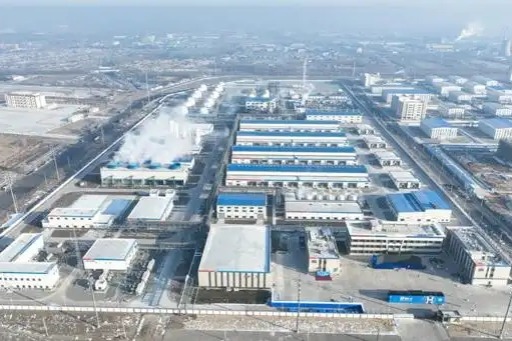Developing economies 'will benefit the most'

Better infrastructure, improved connectivity expected to have impact on long-term growth
Louis Kuijs believes China's Belt and Road Initiative could give the global economy a major boost over the longer term.
The head of Asia economics at Oxford Economics, a leading economics research organization, also insists that developing economies will benefit the most.
"It is a worthwhile endeavor and if it is well managed, it is likely to be a significant boost to long-term economic growth in a large part of the world, particularly that which is currently the least developed," he says.
| Louis Kuijs, head of Asia economics at Oxford Economics, says the major impact of Belt and Road will be in increasing the connectivity between countries through better infrastructure. Roy Liu / China Daily |

The 52-year-old economist was speaking ahead of the Belt and Road Forum for International Cooperation, which takes place in Beijing on May 14 and 15.
He is the author with Tianjie He of One Belt, One Road - China's Grand Ambition, a research paper published by Oxford Economics to coincide with the event.
The report concludes that the 65 countries that are linked to the initiative's two main routes - the Silk Road Economic Belt and the 21st Century Maritime Silk Road - will contribute 80 percent of global growth by 2050, up from 68 percent in 2016.
Kuijs insists the major impact of Belt and Road will be in increasing the connectivity between countries through better infrastructure, rather than through any investment boost from construction activity.
"If you look at the 65 countries that are on the current routes, they represent a gigantic economy. They are not going to be significantly boosted by direct investment in infrastructure even if this is dozens of billions of dollars a year," he says.
"Where it will provide long-term benefits is the impact of better infrastructure, improved connectivity, so goods can be transported more easily, also enabling people themselves to get closer to markets in remoter areas. All these will have an impact on longer-term growth."
Kuijs insists this greater connectivity would reduce the risk of catastrophic events that can have a damaging effect on economic growth.
"Developing countries are always subject to many risks. These can range from severe supply-side bottlenecks to political issues arising between countries that can lead to conflicts," he says.
"So instead of trying to measure the benefits of the initiative by trying to calculate whether it might have a 0.3 or 0.4 percent positive impact on a country's growth, you need to see it more in terms of it reducing the risk of 20 percent being knocked off a country's GDP because of some incident. I find that a more credible line of argument."
Kuijs believes China is an impressive role model in terms of how investing in infrastructure has provided a platform for economic growth after reform and opening up began in the late 1970s.
He says much of the infrastructure in Western countries now compares unfavorably with that in China.
"When you fly from China to the US now, you are not quite sure which is the developing country and which the developed," he jokes.
"I have no evidence to say, however, that having infrastructure more than 150 years old is holding back development of Europe or the US. With India and Brazil, however, I am pretty comfortable saying that that is the case."
Kuijs, who is from a rural area near the naval port of Den Helder in the Netherlands, originally studied to be an engineer but later switched to economics, studying at both the University of Amsterdam and the London School of Economics.
He became a senior economist for the International Monetary Fund in Washington in the 1990s before moving to the Beijing office of the World Bank in 2004, where he was senior economist for seven years.
Regarded now as one of the leading commentators on the Chinese economy, he was Greater China chief economist for Royal Bank of Scotland before taking up his current Hong Kong-based role in 2015.
Unlike some economists, he is not so overly concerned about China's debt position.
"This is not Thailand in 1997, South Korea in 1996 or Spain in 2008," he says.
"The issue with debt in China is not as if they (the authorities) are with their backs against the wall, and so it remains up to them when they are going to take action to reduce credit growth. They will obviously have to at some point but this may have the effect of only reducing growth by a percentage point. We are not going to see some major reversal as many keep predicting."
Kuijs does believe Belt and Road will provide a boost for China's construction sector, which has been squeezed at home by the slowdown in the economy.
"The turnover of Chinese construction and engineering companies is already booming abroad, and Belt and Road is undoubtedly a significant factor in this," he says.
He, however, says it will provide less of a boost to the steel and cement sector, much of which is located in Northeast China, sometimes referred to as China's Rust Belt.
"It is not going to make a big difference to these sectors. You can't move cement over large distances, and it is not that economically attractive to move low grade steel for construction projects either."
He says the initiative will help tackle Asia's infrastructure deficit. According to the Asian Development Bank, Asia needs to spend $1.7 trillion a year on infrastructure up to 2030 just to maintain its current growth levels. It is currently spending just around half of that, $881 billion.
"There is clearly lots of need for infrastructure in almost any emerging market. The challenge, however, is whether these projects can be managed in a way where the benefits exceed their costs," he says.
"In China's case that has worked. The infrastructure projects have been broadly successful in reaping economic returns. It will depend on the governance as to whether this success can be replicated. There are many reasons why projects go wrong in developing countries."
Kuijs sees Belt and Road as a modern-day Marshall Plan, which regenerated Europe after World War II, and is hopeful greater impetus will come from the forum.
"The fundamental premise of all of this is the lesson from economic history that greater connectivity has always been a boon to economic development," he says.
andrewmoody@chinadaily.com.cn
(China Daily Africa Weekly 05/12/2017 page7)
Today's Top News
- China warns about Japan's intended military buildup
- China urges EU to halt anti-subsidy probes
- Experts: Lai not freedom fighter, but a pawn of the West
- Hainan evolves as gateway to global markets
- Opening up a new bridge between China and world
- Tour gives China-Arab strategic trust a boost































